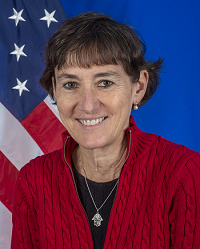Prompt resolutions to international child abductions key
이 글자크기로 변경됩니다.
(예시) 가장 빠른 뉴스가 있고 다양한 정보, 쌍방향 소통이 숨쉬는 다음뉴스를 만나보세요. 다음뉴스는 국내외 주요이슈와 실시간 속보, 문화생활 및 다양한 분야의 뉴스를 입체적으로 전달하고 있습니다.

As the U.S. State Department’s Special Advisor on Children’s Issues, I had the opportunity recently to visit Seoul on the eve of the 70th anniversary of bilateral relations between the United States and Korea.
Because of our strong partnership and shared values, we were able to reflect on our mutual successes in protecting children and engage on a wide range of issues of importance to both of our nations.
At the forefront of my visit agenda was a discussion on our mutual responsibilities under the 1980 Hague Convention on the Civil Aspects of International Child Abduction, an international treaty that provides a civil remedy for parents to seek the return of a child wrongfully removed or retained by another parent across international borders.
Both the United States and Korea, as parties to the Hague Convention, pledge to cooperate on resolving these cases. By providing a private legal framework for an abducted child’s return, the Convention can also deter parents from unilaterally removing their children.
Korea signed on to the Hague Convention in 2013.
According to the State Department’s 2022 Annual Report on International Child Abduction, Korean authorities regularly took appropriate steps to locate children after a Convention application was filed.
On average, it took less than one week to locate a child. Furthermore, Korean judicial authorities routinely ordered the return of children in Convention cases to their habitual residences in accordance with treaty obligations.
However, Korea was still listed in that report as a country that demonstrated a pattern of noncompliance.
There are abduction cases between Korea and the United States that have been pending for more than 12 months, and the longest pending case has been unresolved for over three years.
Although Korean courts have been consistent in promptly ordering the return of children to their habitual residence, they continue to falter in actually enforcing these orders. We ask that Korean court authorities renew their approach to quickly resolving these long-standing cases and reunite children with their left-behind parents.
When it acceded to the Convention in 2013, Korea expressed its desire to work together with likeminded nations to protect children from the harmful effects of international abduction and to establish procedures to ensure their prompt return to the country of their habitual residence.
Consistent with that expression, I urge our Korean partners to act expeditiously to enforce the Korean court orders for the return of these abducted children to their habitual residence.
When I meet with left-behind parents who have had their children abducted to Korea, I hear their stories of pain and hope.
These parents spend years in multiple legal proceedings, compounding their misery and draining their resources. Courts and other authorities in both Korea and United States agree: it is time to secure the prompt return of these children to their habitual residence.
MICHELLE BERNIER-TOTH, STATE DEPARTMENT SPECIAL ADVISOR FOR CHILDREN’S ISSUE
Copyright © 코리아중앙데일리. 무단전재 및 재배포 금지.
- Singer, actor Lee Seung-gi to marry actor Lee Da-in on April 7
- BTS leaves Grammys empty-handed third year in a row
- Korea sending emergency personnel, medicine and aid to Turkey
- North's Kim Jong-un visits military barracks for 75th anniversary of Korean People's Army
- Kakao buys 9% of SM Entertainment, now 2nd largest shareholder
- Apple confirms that Apple Pay will be coming to Korea
- Kakao-SM Entertainment deal challenged by agency's founder
- Sindang Station killer sentenced to 40 years in prison
- SM Entertainment to establish its first multi-label system
- Myung Ho of boy band 8TURN denies bullying allegations